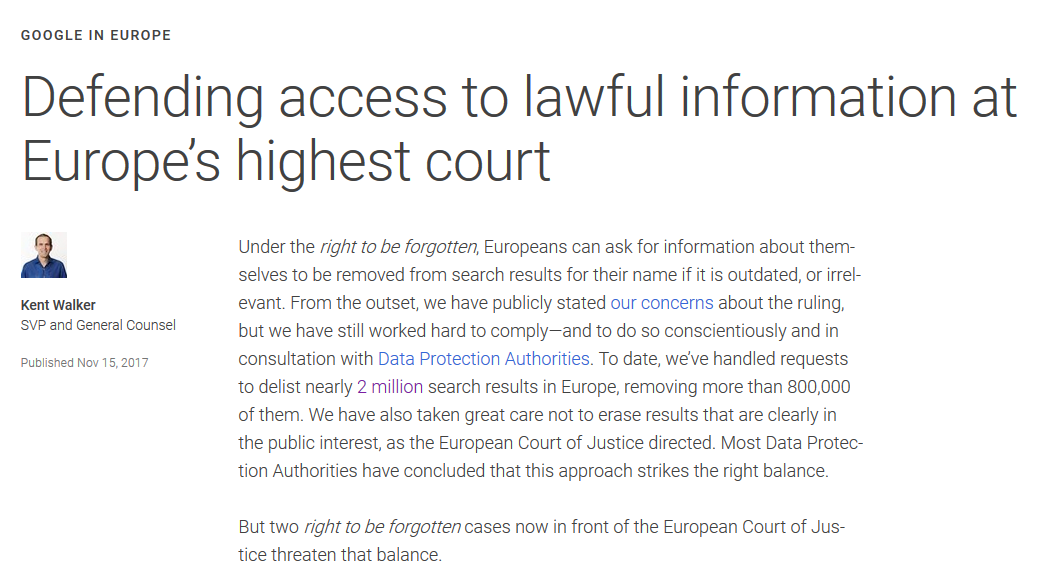Vorige week publiceerde Google een blogpost, geschreven door Kent Walker, over het vergeetrecht. In dit artikel wordt deze publicatie besproken en voorzien van commentaar.
Hieronder de tekst van het artikel in italics, voorzien van commentaar.
Under the right to be forgotten, Europeans can ask for information about themselves to be removed from search results for their name if it is outdated, or irrelevant. From the outset, we have publicly stated our concerns about the ruling, but we have still worked hard to comply—and to do so conscientiously and in consultation with Data Protection Authorities. To date, we’ve handled requests to delist nearly 2 million search results in Europe, removing more than 800,000 of them. We have also taken great care not to erase results that are clearly in the public interest, as the European Court of Justice directed. Most Data Protection Authorities have concluded that this approach strikes the right balance.
Welke Privacy Autoriteiten dat precies zijn en hoe ze dit bepalen blijft onduidelijk. Wellicht dat Google dit zelf afleidt aan de hand van het geringe aantal verzoeken tot bemiddeling? Van de bemiddeling leidt een substantieel deel overigens alsnog tot verwijdering. De AP oordeelde bijvoorbeeld 70x dat het oordeel van Google juist was, en 55 keer dat dit onjuist was. Dat zijn m.i. geen statistieken waar je als Google graag mee schermt. In een blogpost als deze moet Google de stellingen onderbouwen.
But two right to be forgotten cases now in front of the European Court of Justice threaten that balance.
In the first case, four individuals—who we can’t name—present an apparently simple argument: European law protects sensitive personal data; sensitive personal data includes information about your political beliefs or your criminal record; so all mentions of criminality or political affiliation should automatically be purged from search results, without any consideration of public interest.
If the Court accepted this argument, it would give carte blanche to people who might wish to use privacy laws to hide information of public interest—like a politician’s political views, or a public figure’s criminal record. This would effectively erase the public’s right to know important information about people who represent them in society or provide them services.
In theorie heeft Google hier een punt, in de praktijk niet. In verschillende rechtszaken in Nederland heeft de rechterlijke macht, ook juist in dit soort zaken, gezocht naar een belangenafweging. De meest relevantie jurisprudentie die hierover is betreft een uitspraak van het Gerechtshof. Het Hof maakte hierbij, voor strafrechtelijke persoonsgegevens, expliciet een belangenafweging. Hierbij beriep het Hof zich op de journalistieke exceptie van artikel 3 Wbp/artikel 9 PRl die dit mogelijk maakt. Er is zowel in theorie als in de praktijk dus, binnen de huidige wetgeving, ruimte voor een belangenafweging. Dat Google dan toch spreekt over “without any consideration of public interest.” is simpelweg onjuist en neigt naar het verspreiden van”fake news”.
In the second case, the Court must decide whether Google should enforce the right to be forgotten not just in Europe, but in every country around the world. We—and a wide range of human rights and media organizations, and others, like Wikimedia—believe that this runs contrary to the basic principles of international law: no one country should be able to impose its rules on the citizens of another country, especially when it comes to linking to lawful content. Adopting such a rule would encourage other countries, including less democratic regimes, to try to impose their values on citizens in the rest of the world.
In dit punt kan ik Google volgen; het is niet aan de Europese wetgever te bepalen wat Amerikanen in hun eigen lang wel/niet mogen zien. De huidige praktijk is dat berichten worden geblokkeerd voor zoekopdrachten in alle Europese versies van Google én voor zoekopdrachten in Google.com, verricht uit het land van de verzoeker. Die laatste nuance geeft dus nog ruimte voor een uitbreiding zonder dat daarbij de E.U. haar boekje te buiten gaat. Een goede middenweg zou zijn om de berichten te blokkeren voor álle zoekopdrachten vanuit de E.U., onafhankelijk van de gebruikte versie van de zoekmachine. Daarmee wordt de huidige praktijk dus uitgebreid tot zoekopdrachten in Google.com, verricht vanuit ieder Europees land. De recente aanpassingen die Google heeft gemaakt aan het algoritme, waarbij de getoonde resultaten voor bezoekers in álle zoekmachines gelijk zijn, en louter afhankelijk van de locatie van de zoekopdracht, zijn hier een perfecte voorbereiding op.
We’re speaking out because restricting access to lawful and valuable information is contrary to our mission as a company and keeps us from delivering the comprehensive search service that people expect of us.
But the threat is much greater than this. These cases represent a serious assault on the public’s right to access lawful information.
We will argue in court for a reasonable interpretation of the right to be forgotten and for the ability of countries around the world to set their own laws, not have those of others imposed on them. Up to November 20, European countries and institutions have the chance to make their views known to the Court. And we encourage everyone who cares about public access to information to stand up and fight to preserve it.
Google werpt zich hier op als beschermer van het vrije woord, zeer nobel. Het is natuurlijk niet met zekerheid te stellen, maar bedrijfseconomische afwegingen spelen hierin waarschijnlijk een grotere rol dan morele standpunten. Privacy is net zo goed een grondrecht, maar zoals bekend is dat voor Google vooral een hinderlijk iets, slechts waard om tégen te vechten.
Willem van Lynden, MediaMaze
